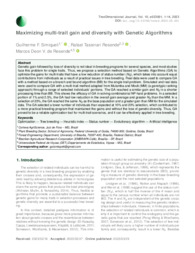Maximizing multi-trait gain and diversity with genetic algorithms.
Maximizing multi-trait gain and diversity with genetic algorithms.
Autoria: SIMIQUELI, G. F.; RESENDE, R. T.; RESENDE, M. D. V. de
Resumo: Genetic gain followed by loss of diversity is not ideal in breeding programs for several species, and most studies face this problem for single traits. Thus, we propose a selection method based on Genetic Algorithms (GA) to optimize the gains for multi-traits that have a low reduction of status number (NS), which takes into account equal contributions from individuals as a result of practical issues in tree breeding. Real data were used to compare GA with a method based on a branch and bound algorithm (BB) for the single-trait problem. Simulated and real data were used to compare GA with a multi-trait method adapted from Mulamba and Mock (MM) (a genotypic ranking approach) through a range of selected individuals’ portions. The GA reached a similar gain and NS in a shorter processing time than BB. This shows the efficacy of GA in solving combinatorial NP-hard problems. In a selected portion of 1% and 2.5%, the GA had low reduction in the overall gain average and greater NS than the MM. In a selection of 20%, the GA reached the same NS as the base population and a greater gain than MM for the simulated data. The GA selected a lower number of individuals than expected at 10% and 20% selection, which contributed to a more practical breeding program that maintained the gains and without the loss of genetic diversity. Thus, GA proved to be a reliable optimization tool for multi-trait scenarios, and it can be effectively applied in tree breeding.
Ano de publicação: 2023
Tipo de publicação: Artigo de periódico
Unidade: Embrapa Café
Palavras-chave: Algorithms, Genetics, System optimization, Tree breeding
Observações
1 - Por padrão são exibidas publicações dos últimos 20 anos. Para encontrar publicações mais antigas, configure o filtro ano de publicação, colocando o ano a partir do qual você deseja encontrar publicações. O filtro está na coluna da esquerda na busca acima.
2 - Para ler algumas publicações da Embrapa (apenas as que estão em formato ePub), é necessário ter, no celular ou computador, um desses softwares gratuitos. Sistemas Android: Google Play Livros; IOS: iBooks; Windows e Linux: software Calibre.
Acesse outras publicações
Acesse a Base de Dados da Pesquisa Agropecuária (BDPA) para consultar o acervo completo das bibliotecas da Embrapa.

